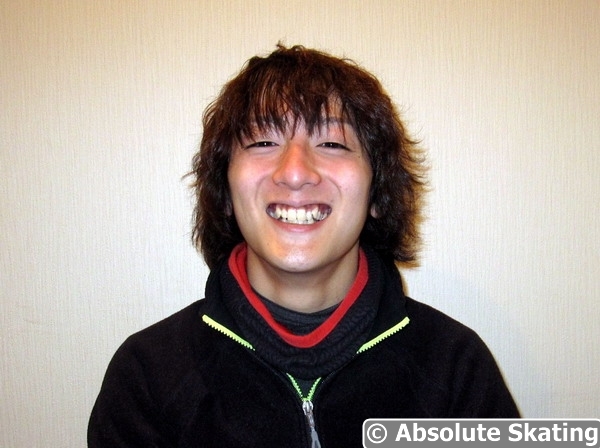Akio Sasaki: "I want to be a unique skater"
 May 31, 2011
By Atsuko Kuryu
Photos © Absolute Skating
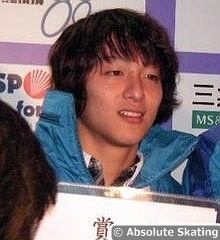 Some of you may not know his name. Let me proudly introduce Akio Sasaki from Japan, a skater who received good recognition from figure skating experts. However, with very strong skating stars at the top, it is not easy for second or third runner-ups like him to emerge in Japan.
Some of you may not know his name. Let me proudly introduce Akio Sasaki from Japan, a skater who received good recognition from figure skating experts. However, with very strong skating stars at the top, it is not easy for second or third runner-ups like him to emerge in Japan.
Sasaki’s first major international competition was the 2007 Lake Placid Junior Grand Prix. He placed fourth there and his performance impressed many people who watched him. Nancy Kerrigan – commentator of the icenetwork web broadcast - praised his footwork and his talent to entertain the crowds. At the 2009 Nebelhorn Trophy, where Sasaki placed seventh, Stéphane Lambiel’s coach Peter Grütter stopped him as he left to congratulate him on his “brilliant performance”.
Now that Sasaki is 20 years old, he feels he doesn’t have much time left. Luckily I had the chance to talk to him at Kanagawa Ice Rink to try and find out, how a talented skater like him, would figure out a strategy for success and set goals for the future.
Thank you very much for sharing time with us. First of all, please tell me how and when you started skating?
When I was very young, I came to skate at Kanagawa Ice Rink with my family. As my older brother decided to join a skating class, I followed him.
Does your brother still skate, too?
No, he quit very soon after.
But you continued. Why?
At the Christmas event of the rink, one of older male skaters performed a figure skating program for us. I thought it was really cool and that it would be nice if I could skate like him.
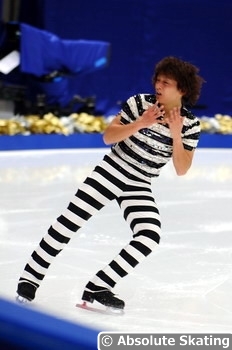 Who was your idol when you were very young?
Who was your idol when you were very young?
Evgeni Plushenko! He was overwhelmingly strong. Since I was very young I didn’t care so much about his skating skills or how much artistry he had. I was just attracted to his mighty power.
When was your first competition?
I’m not sure but maybe when I was in 2nd or 3rd grade.
What was the result?
5th or 6th in Novice Nationals
How did you feel?
Well, I think I loved to skate in front of people. I was too young to feel shy, so I really enjoyed my first performance.
Did you think that your dancing and footwork were outstanding at the time? I think you are really good at both now. Or did someone else say you had a special talent for dancing and performance?
Yeah, some people told me so and I was sure I could win if only I could land the same jumps that other skaters did. I had confidence that I was a good dancer and no other skaters of my age could do as well as I did.
Did you enjoy competing?
Yes, a lot. But I was a bad jumper so it troubled me even then.
Seeing your results, you went up steadily but suddenly you sat out the 2005-2006 season. Why?
I couldn’t add triple jumps to my repertoire since I was in 6th grade. And I couldn’t land a clean double axel. I knew my spins and skating skills improved but I felt like it meant nothing to compete without triple jumps and a double axel. The result would have been the same as the year before. At the same time you needed a lot of money to participate in the competition. I didn’t want my parents to pay extra money for my competition for nothing.
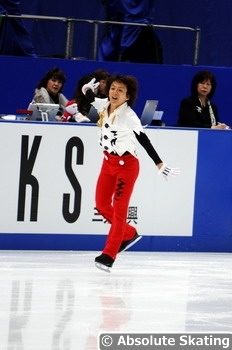 Did you feel uncomfortable for owing your parents money for figure skating?
Did you feel uncomfortable for owing your parents money for figure skating?
Yes. As you know, figure skating costs a lot of money. You need money for skates, rinks and lots more. Both of my parents are workers, especially my mother has been working hard and let me continue figure skating. I owe her a lot, I always knew it.
I can imagine how you felt. But after that, you had a small breakthrough in the 2006-2007 season. You came 6th at the 2006 Junior Nationals and 3rd at both the Interscholastic Athletic Meet and National Athletic Meet in 2007. Do you think it worked out well for you to sit out the one season?
I don’t think it did mentally. But technically things changed all of a sudden. Just the day before my team skaters left for the national event, I landed a triple toe loop cleanly for the first time. The next day I landed a double axel cleanly. Since then, I was able to land them relatively consistently. I felt like I saw the light at the end of a long tunnel. I thought I could see a bright prospect. And at that time I had nothing to lose so that I could skate spontaneously.
Can a skater land jumps so suddenly?
Well, when you work on one jump, you have an image in your mind like how to take off, rotate and land. You make so many attempts without success. But one day everything comes together at the same time. Once you can land a jump you might be surprised to know how easily you can land it and how comfortable it feels to land it, too. You don’t need to check your images point by point. It doesn’t mean you can do it all the time after that. But maybe you can do it relatively consistently.
How about the Lutz? Your Lutz is quite high, isn’t it?
Well, I have another story about the Lutz. When I had a level test, I needed to land a triple jump other than the toe-loop. I tried triple Salchow two times and failed. When I was given another chance, I went to the coach and said, “Can I try triple Lutz? I don’t think I can rotate the triple Salchow at all.” Somehow I felt like I could land the triple Lutz. She agreed. So I tried the triple Lutz and made it! Actually, I failed the first one but it was very close so they gave me one more chance. Then, I could land it finally.
And now you do well with the Lutz, right?
Well, many skaters might say it is very difficult but it works for me. I feel more comfortable with this jump.
Maybe you don’t like edge jumps, do you?
No. I guess I prefer toe jumps because I can use the speed I glide with.
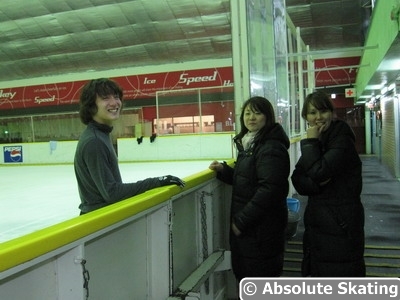 I see. Let’s get back to your history and the 2007-2008 season. I guess this season was a very important one for you?
I see. Let’s get back to your history and the 2007-2008 season. I guess this season was a very important one for you?
Well, I guess yes.
When I saw you at the Lake Placid Junior Grand Prix, I was surprised to know we had such an amazing talent in Japan. Was it the first international competition for you?
No, the second. I attended Youth Olympics in Australia earlier that season but it was just a kind of festival and not that serious. The Lake Placid JGP was completely different. First of all, I had never been to such a big venue and skated in front of such huge crowds.
And you did a very good performance there.
Not that good but it was a great experience for me. The audience cheered a lot for me which pushed me in many ways. I enjoyed performing there more than in any competitions I had taken part in before.
You said your programs in 2007, Coffee Rumba and Robots are your favorites.
Yes. It is the season that made me who I am as a skater. Actually that was the first season when I participated in choosing my music. I listened to some music with my coaches and then I came across Coffee Rumba. I thought it was really cool. I still skate this program for fun.
How about your free program, Robots? Actually I love this program very much. Costumes, choreography, music, etc. all fitted very well. All entertaining!
My performance was not so good technically, however, yes, it’s a very entertaining program. I have not seen my performance yet until now, but I was trying to be entertaining throughout the program. Since the short program was cool, we chose funny and light music for the free skate. And I’m sure it worked.
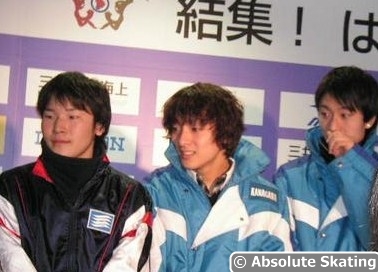 Yes. I watched your performance through web streaming then. Nancy Kerrigan admired you a lot. She said that despite some issues with the jumps, your performance was really entertaining. She also said she loves your footwork which was so quick and smooth and fun to watch.
Yes. I watched your performance through web streaming then. Nancy Kerrigan admired you a lot. She said that despite some issues with the jumps, your performance was really entertaining. She also said she loves your footwork which was so quick and smooth and fun to watch.
Is that so? I felt no reason to hesitate when I skated that program. I was totally into this enjoyable music.
After you participated in Senior Nationals and the World Junior Championships in your last season as a junior, you stepped up to the senior stage. As Japan has a very deep Men’s field now, I guess it might be very tough for you to emerge there.
Yes. I feel so very strongly.
Could you explain how you feel?
Hanyu became very strong as did Keiji Tanaka (who recently won the silver medal at Junior Worlds). We have so many junior skaters who can do the triple axel. I think I could be better if only I could do the same jumps they do, however, I can’t in reality. That makes me very frustrated.”
There are some more skaters you have to catch up with such as Machida, Mura, Murakami… in the light of this situation, how do you set your goals? How do you think about the top three skaters? I mean Takahashi, Oda and Kozuka.
Of course I want to be first. I’m actually aiming for the Sochi Olympics in 2014. I know I don’t have much time and I need to be third or fourth at Nationals this year. By saying this, I don’t mean that I want to just be behind the top three. I want to be an equal competitor to Takahashi and other top skaters in time.
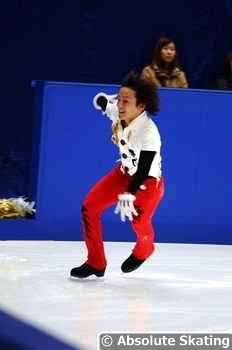 What do you need to achieve your goal?
What do you need to achieve your goal?
First of all I have to make my triple axel consistent. I can land it in practice at a good rate but landing it in competition is a different story. Adding to it, I want to include a quadruple in my program. I also need to stabilize my triples.
Do you have a strategy?
I’m working on core training. If you train the core muscles, you can control your movement more easily. When you do jumps or spins, it will help you to feel more comfortable and even when your jumps aren’t very good, it will help you to land them without falling. And I am also working on ankle exercise to increase ankle mobility.
You included a triple axel in this season’s programs. When did you land it?
I could land the triple axel before 2009 Nationals. It is not consistent yet but you can get more points even when you fall so I decided to do it in my programs.
Is the triple axel very difficult?
For me, yes. I feel disappointed because I haven’t made it consistent.
But still you feel you can make it that, right?
Yes, if only I could get the hang of it, I could make my axels consistent and even land a quadruple jump.
Despite of your talent as an artistic skater, you are not famous yet on the international stage. Are you frustrated with your situation?
As you know, Florent Amodio also competed at the 2007 Lake Placid JGP. We were at the same stage in 2007. Now he is a European Champion. I am really frustrated when I think of the gap between us. I can dance. I have good footwork. If only I could land consistent jumps, I could be also be a Champion.
What do you think is the reason for not landing the jumps in competition?
I think it is because I lack confidence. My jumps in practice are lacking stability. One day I can land all the jumps I attempt, but the other day, I can’t land any of them. I need to increase my odds of steady jumps.
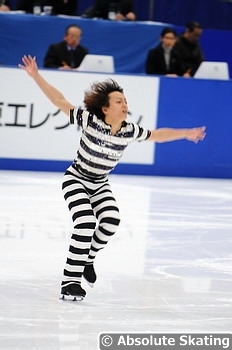 Is your instability caused by a mental problem or a technical one?
Is your instability caused by a mental problem or a technical one?
I think the mental reason is bigger. I don’t have enough confidence to land the jumps in competition. I don’t think I’ve established patterns yet, for example where to put my hand during take-off. Of course, I have a little, but not enough. That’s why I’m lacking in consistency. Now I’m trying to get the right strategy for jumps. Speed and vigor has helped my jumps so far and that is one of the reasons for the inconsistency of my jumps. So I’m trying to jump with low speed and get the right cue. If I could establish a good pattern, I would be more confident.
Since you are really good when it comes to the artistic side, don’t you think of becoming a show skater?
People have asked me the same question many times. But I love competitions. I find the real thrill in competitions where you have to skate with restricted elements and be judged and awarded with points. So, of course I would skate in a show now and then but I don’t think I’ll be a professional skater soon.
But after you retire, you may become a show skater…
It sounds attractive. Who knows? To tell the truth, I hope to become a coach.
I see. Please tell me something about figure skating and you.
Figure skating and me…it’s not easy to say…I have been growing up with figure skating. I’m improving my character through it. My coaches have been with me and supported me during all my figure skating life…so figure skating is a major part of my life, and a way for moving into the adult world. If I can give all my efforts to figure skating, it will help me to thrive in my future. It will make me a mature and broad-minded person. And also it’s a kind of dream. I’m really grateful for my mother and my two coaches, Akiko Sato and Misao Sato so I want to make them happy with my skating.
How nice! You really like your coaches.
Yes. I think they are the one and only coaches for me. They really are my mentors in life. They gave me everything I have now as a figure skater. I’m not rich and I feel like there are no benefits for them to teach me. But they are always with me and watch me, support me, and lead me in the right direction. So when I retire, I would be happy if they thought it was a good thing in their lives to teach me. I will stick with them until I quit figure skating.
Now let’s talk about your future. What kind of a skater do you aim to be? I heard you like Daisuke Takahashi and Emanuel Sandhu.
Yes. I look up to Daisuke because he is not only artistic but also excellent technically. I like Emanuel, too. However, it doesn’t necessarily mean I want to be like them. I want to create my own style. I want people to say of me, “There is no other skater like Sasaki.”
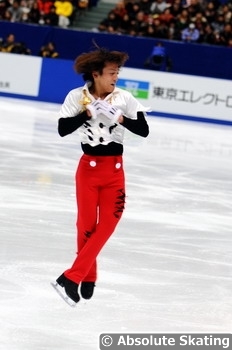 Daisuke can involve the crowds. He’s not just performing his program but also appeals to the audience. Is that what you aim for?
Daisuke can involve the crowds. He’s not just performing his program but also appeals to the audience. Is that what you aim for?
Yes. He is more than expressive. He has room to appeal the crowds even when he skates the most difficult programs. It is one thing I can’t do. I have to use the utmost of my power to do a complicated program the IJS requires us to do. So I have to improve my skills to skate like him.
What is your goal next season?
I want to be able to go to a Grand Prix event. Once I am assigned, I don’t just want to go but to reach the podium there. At least I have to skate in the last group in the free skate at Nationals to make it real. That is my goal next season.
What score do you set your mind on?
First of all I have to reach 200 in total. The eventual goal is over 220; maybe 75 to 80 in the short program and 140 to 160 in the free skate.
And what kind of programs will you skate?
So far I have skated to energetic music with high tempo but I don’t exclude other choices. I can skate to classical music if I feel uplifted to do that. I like tangos and Spanish music but I think I can do more. For example I chose classical music for my SP (An der schönen, blauen Donau) but made it original with a wail of siren (A murder case). I want to use classical music in a way where I can make it original and unique.
Sasaki truly is an amazing skater – that’s guaranteed. And at the same time, he still has many problems, which are not so easy to overcome. Still, I hope he can manage to get through them and become a real Sochi Olympics hopeful.
During our interview, Sasaki talked with a tough view on things, nevertheless he mentioned “There is not enough time for me” several times. He seemed to be shifting between self-confidence and nervousness. Maybe there is a tension between how he wants to be and how he is. Sasaki came 16th at the 2010 Nationals, which may have been a big blow to him. But he still stays positive. I think this is his biggest charm and advantage.
